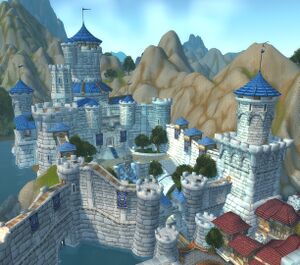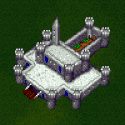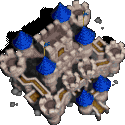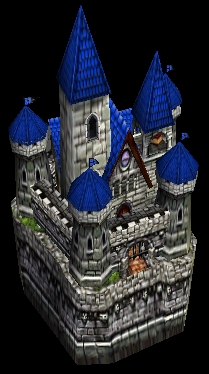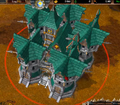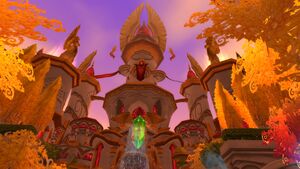Castle
Castles are the center of large human and Alliance military cities. The human castles of the Warcraft universe harken to a medieval style,[1] but several races like the high elves and blood elves of Quel'Thalas, or the mogu in Pandaria, are known to also build fortified palaces.
First War
- Main article: Stormwind (WC1 Human)
Stormwind Keep was the seat of power of the human kingdom of Stormwind during the First War, and was later destroyed by the Old Horde during the final days of the war.[2]
Second War
- Main article: Castle (Warcraft II)
The mighty castles of Lordaeron were the center of large military cities. As with the lesser keeps, peasants could bring gold and lumber here for judicious dispersal in order to sustain the war effort. These bastions against invasion were guarded by fortified battlements, making them virtually indestructible. The castle represented the strength of the peoples of the Alliance and their unyielding resolution to defend the whole of humanity against the Orcish Hordes.[3]
Stormwind Keep itself was represented in-game by a generic keep building that was eventually upgraded into a castle by the human AI.[4] Several unnamed castles also appeared during the campaigns of the game, for example in Alterac City, Capital City and Kul Tiras.
Third War
Human castle
- Main article: Castle (Warcraft III)
Castles represent the pinnacle of advanced human civilization. With this advancement comes the ability to support stables for housing the war-steeds of the heroic knights. This progression also allows the building of gryphon aviaries.[5]
During the Invasion of Durotar, Admiral Proudmoore had a unique Castle built in Tidefury Cove, surrounded by five Castle Guard Towers.
Proudmoore's Castle in Tidefury Cove.
Proudmoore's Castle in Reforged.
High/Blood elven castle
The Castle helped the high elves to fend off Arthas and the Scourge as he tried to attack their capital city of Silvermoon City and Quel'Thalas in Warcraft III: Reign of Chaos by serving as a returning point for gold and training units. This Castle looks the same as the regular human Castle, but trains high elven peasants instead of the regular human peasants, and lacks the Call to Arms ability (since high elven peasants cannot become Militia).
The castle also helped the blood elves and Kael'thas during the Curse of the Blood Elves campaign in The Frozen Throne. This castle produced unique blood elven-only units. Kael himself once used a Tiny Castle during his campaign.
World of Warcraft
Following the Scourging of Lordaeron, not many castles are still left standing in Azeroth. Stormwind Keep was rebuilt after the Second War. Undercity was built beneath the throne room and the royal crypts of the former palace of Lordaeron. The palace in Alterac is still relatively intact, albeit occupied by the ogres. The Sunfury Spire palace of Silvermoon City was also rebuilt. As seats of ruling, the Throne of Thunder and the Mogu'shan Palace could also probably be considered as mogu castles.
A fully-upgraded Lunarfall garrison is considered to be a castle.[6]
The Ruins of Lordaeron in Battle for Azeroth.
The old Stormwind Keep
In the RPG
A castle is a keep usually surrounded by a 15-foot stone wall with four towers. Huge castles have a particularly large keep with numerous associated buildings (stables, forge, and the like) and an elaborate 20-foot high wall creating a bailey and courtyard areas. The wall has six towers. Castle walls are usually ten feet thick.[7]
Gaval Moch is an example of an old and abandoned castle in Silverpine Forest.
References
- ^ 2014-02-20, Heroes of the Storm Developer Q&A Part 3 (Feb 20, 2014) – Transcript. Blizzplanet, retrieved on 2014-06-15
- ^ Stormwind Keep (WC1 Orc)
- ^ Warcraft II: Tides of Darkness manual, Alliance Buildings, Castle
- ^ New Stormwind (WC2 Orc)
- ^ Warcraft III manual, pg. 76.
- ^
 [40] My Very Own Castle
[40] My Very Own Castle
- ^ World of Warcraft: The Roleplaying Game, pg. 202.

